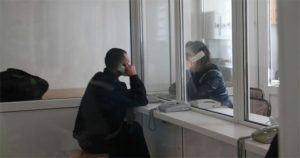 Article 110 of the Criminal Executive Code guarantees confidentiality of meetings with a lawyer to the convicted person. One of the important elements is the ability to communicate with a lawyer in a room without solid dividing glass. In practice, this legal norm is systematically violated.
Article 110 of the Criminal Executive Code guarantees confidentiality of meetings with a lawyer to the convicted person. One of the important elements is the ability to communicate with a lawyer in a room without solid dividing glass. In practice, this legal norm is systematically violated.
The existing problem was investigated by the Ukrainian Bar Association during the meeting on May 6.
The reason for the gathering was the appeal of lawyer Yevheniia Shari, who reported that on April 17, at the request of the North Interregional Center for Legal Aid, she arrived at Zhytomyr Correctional Colony No. 4 to conduct a confidential meeting with the convict. She provided all the necessary documents, including a copy of the authorization and the lawyer’s certificate, and in writing requested to conduct the meeting without the dividing glass.
After passing the checkpoint and waiting in the institution, the lawyer was informed that the meeting could only take place through glass in the presence of other persons. Alternatively, she was offered to conduct the meeting without glass, but (for her safety) subject to a personal search by a female employee of the institution. The woman refused the search, citing her professional status and the lack of grounds for such actions, particularly due to compliance with clothing requirements and the open content of the document folder. In response, Y. Shari was informed that refusal of the search prevents the meeting with the convict under confidential conditions.
As a result, she was unable to conduct the planned communication and sign the necessary documents with the client.
The lawyer is convinced that the refusal of a confidential meeting and the requirement for a personal search violate her professional rights, hinder the exercise of advocacy activities, and do not ensure the preservation of attorney-client privilege.
Additionally, she pointed out that there is no specially equipped room for confidential meetings between a lawyer and a client in the institution, and in most cases, meetings are held through glass. Therefore, such violations have a systemic nature. At the same time, effective mechanisms for protecting the rights of lawyers during the performance of professional duties in penal institutions are absent.
For penitentiary institutions, lawyers are considered as “sources of increased danger,” for which an additional set of measures is applied, noted the Chair of the NAALC Committee on Legal Aid, RAU member Oksana Kadenko.
She explained that in order to comply with the quality standards of legal aid, a lawyer must sign certain documents with the client, including a protocol of agreement on positions containing attorney-client privilege. When the meeting takes place through glass, the documents are handed over through a staff member of the penitentiary institution, who, as part of the check, familiarizes himself with their content and decides whether to provide them to the convict.
“The lawyer tried to explain, operate with legal norms, initiate their application to ensure precisely a confidential meeting… without dividing glass, without a handset, with the ability to hand documents to the client, directly receive information and pass it on, but received a refusal,” commented the situation O. Kadenko. Referring to her own experience, she noted that in penal institutions, lawyers are indeed directed to rooms equipped with a dividing wall, and the meeting takes place in the presence of an employee of this institution.
RAU member explained the essence of the applicant’s position: the Ministry of Justice has two subsystems: penitentiary and legal aid. A lawyer who received an assignment to provide legal assistance is in a vulnerable position in the penal institution. At the same time, the ministry, having the opportunity to regulate the issue, does not synchronize the work of these two systems.
Since the problem concerns all lawyers, O. Kadenko proposed to make Y. Shari’s case a model and organize an open event in the format of a round table on the platform of the National Bar Association of Ukraine with the involvement of representatives of the Ministry of Justice and the Parliamentary Commissioner for Human Rights.
“I am confident that this institution will be our partner in solving these issues because the violation of the right to a confidential meeting, the lack of mechanisms for proper realization of the rights of convicts to access legal aid, is not only our issue, but primarily the issue of the Human Rights Commissioner,” noted the RAU member. “By joining forces, we can achieve real results, change legal practice, which is necessary for both lawyers and convicts.”
Members of the Ukrainian Bar Association unanimously voted for this decision.



